Buying a Basenji
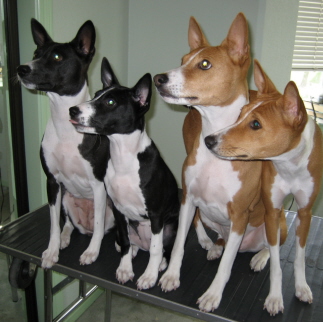 Introduction
IntroductionWhether you are looking to add a basenji as just a family companion or are interested in trying out performance or conformation events it is important to find a responsible breeder. A responsible breeder breeds for health, temperament, and conformation, is involved and active in the basenji community, and is responsible for their puppies from the time they begin to consider breeding a litter through the lifetime of each dog they produce. This guide will help you learn about each of these characteristics so you can make an educated decision about the quality of breeder that you choose.
Health
All living things carry genes for defects, dogs are no exception. In purebred dogs, a responsible breeder should be aware of what inherited disorders are found in the breed and use appropriate health testing and breeding strategies to reduce the likelihood of producing a puppy with a disorder. Without a gene test for a disorder, a breeder must rely on health tests of the dogs they are breeding and their siblings and other relatives to get the big picture of what genes may be present in their family of dogs.
In basenjis there are several disorders that a breeder should be aware of and discuss with potential buyers. They are Fanconi Syndrome, IPSID, Progressive Retinal Atrophy, Hemolytic Anemia, Hip Dysplasia,, Thyroid Problems, and Persistent Pupillary Membrane. Full descriptions of each of these can be found on the Basenji Club of America website.
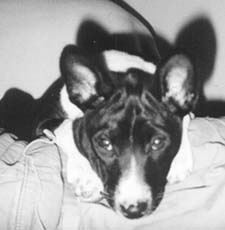 As
a buyer it is important that you ask the breeder about the disorders
listed above and what their breeding plan is to reduce the incidence of
these disorders. For many of these disorders there are tests that
a breeder should be doing. . The Basenji Health Endowment has
funded research to find the gene for
Fanconi Syndrome and hopes to find a direct gene test soon but in the
meantime a linked marker test was released on July 17, 2007. All
litters bred after July 17, 2007 should have at least 1 parent that has
tested Probable Clear/Normal to ensure that all puppies in the litter
will unaffected by the disease. Orthopedic Foundation for Animals, OFA,
certificates are issued for tested dogs and results can be verified at
the OFA website. For Progressive
Retinal
Atrophy, Persistent Pupillary Membrane, and other eye anomalies
breeders should have dogs and puppies examined by a veterinary
Ophthalmologist and obtain a certificate from the Canine Eye Registry
Foundation (CERF) for each dog with passing eyes. CERF
certification can be verified on the CERF website. For
hip dysplasia breeders
should have an OFA certificate
obtained after a dog has reached its second birthday. OFA
certification can be verified on the OFA
website. Thyroid should be tested yearly to verify
that the thyroid is functioning normally and there are no signs of
inherited thyroid disease and an OFA certificate should be
obtained. Pyruvate Kinase Deficiency Hemolytic Anemia has a gene
test available. Responsible breeders should either have had their
dogs tested or be breeding dogs only from families that have already
been tested as clear of this gene.
As
a buyer it is important that you ask the breeder about the disorders
listed above and what their breeding plan is to reduce the incidence of
these disorders. For many of these disorders there are tests that
a breeder should be doing. . The Basenji Health Endowment has
funded research to find the gene for
Fanconi Syndrome and hopes to find a direct gene test soon but in the
meantime a linked marker test was released on July 17, 2007. All
litters bred after July 17, 2007 should have at least 1 parent that has
tested Probable Clear/Normal to ensure that all puppies in the litter
will unaffected by the disease. Orthopedic Foundation for Animals, OFA,
certificates are issued for tested dogs and results can be verified at
the OFA website. For Progressive
Retinal
Atrophy, Persistent Pupillary Membrane, and other eye anomalies
breeders should have dogs and puppies examined by a veterinary
Ophthalmologist and obtain a certificate from the Canine Eye Registry
Foundation (CERF) for each dog with passing eyes. CERF
certification can be verified on the CERF website. For
hip dysplasia breeders
should have an OFA certificate
obtained after a dog has reached its second birthday. OFA
certification can be verified on the OFA
website. Thyroid should be tested yearly to verify
that the thyroid is functioning normally and there are no signs of
inherited thyroid disease and an OFA certificate should be
obtained. Pyruvate Kinase Deficiency Hemolytic Anemia has a gene
test available. Responsible breeders should either have had their
dogs tested or be breeding dogs only from families that have already
been tested as clear of this gene.Responsible breeders are proactive when it comes to the breed’s health. This means they may have additional certifications such as patellas, elbows, and heart so they can catch a potential disorder before it becomes widespread in the breed. They also support health research by donating to the Basenji Health Endowment, and sending samples to the DNA bank to help future research efforts.
Temperament
This trait is often the most important for the pet owner but is also one of the more complicated for the breeder. A dog's temperament is influenced by both what traits it has inherited from it parents and by its environment.
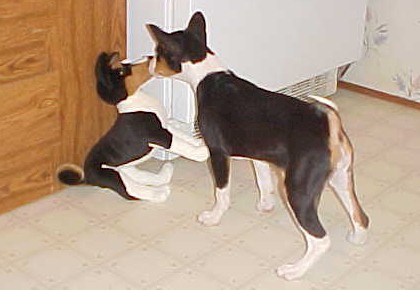 To
get an idea of the inherited portion the best way is to get out and
meet dogs from different families. By doing this you will see
some characteristics are common to all basenjis and some are common to
some families of basenjis. It is normal for a breeder to invite you to
visit with their dogs so you can see if their family of dogs has traits
that will be compatible with your home.
To
get an idea of the inherited portion the best way is to get out and
meet dogs from different families. By doing this you will see
some characteristics are common to all basenjis and some are common to
some families of basenjis. It is normal for a breeder to invite you to
visit with their dogs so you can see if their family of dogs has traits
that will be compatible with your home.The environmental factors that affect a dog's temperament start with the early socialization it receives at the breeders. It is important to ask the breeder what their routine for their puppies is. It is important that puppies are handled everyday. They should also be exposed to the hustle and bustle of an everyday household. From the time their eyes open until about 7 weeks old they should also be exposed to different situations like surfaces to walk on, feeding dishes, sounds, people and locations. This early exposure is what allows puppies to grow into adult dogs that are not as bothered by new places or things. Many breeders have their puppy people come over and visit during this time to help with the socialization process.
It is also important to understand that each dog is an individual and will have traits that make it more or less compatible with a household. A responsible breeder will ask questions of a person inquiring about a puppy to determine their expectations for a puppy. Breeders will use the information provided by the family and their observations of the puppies during the first 7 to 8 weeks to determine which puppies would fit best with each perspective home. Sometimes there might be two puppies that would be equally suitable sometimes there may only be one that has the traits that would make it a good fit. For these reasons it is important to work with a breeder that you feel comfortable talking to and can keep lines of communication open. This early communication will also lay the foundation for a relationship that will last for the life of the dog.
Conformation
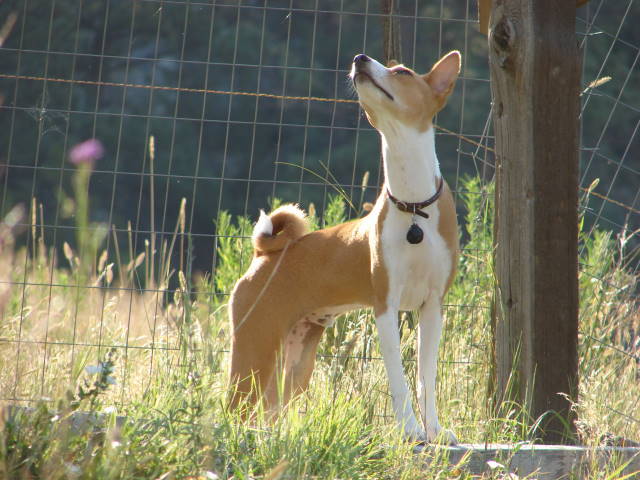 The
correct conformation for a basenji is described in the standard that
was written by the Basenji Club of America and accepted by the American
Kennel Club. The purpose of the standard is to describe what a
basenji’s structure and appearance should be based on its historical
function. In basenjis, this function was as a small hunting hound
that could flush game into nets and hunt independently small game like
local rodents. The traits that make the basenji a good hunter
also make them a good active, athletic companion. A responsible
breeder breeds to the standard to produce dogs that are structurally
sound. They prove this through conformation showing and
participating in performance events that demonstrate their structural
soundness such as lure coursing, sprint racing, or agility and
companion events such as obedience and rally. Basenjis should be
competitive in performance and companion sports even as veterans, dogs
over the age of 7 years old or over the age of 6 for lure
coursing. This means that basenjis should also remain active
companions as veterans.
The
correct conformation for a basenji is described in the standard that
was written by the Basenji Club of America and accepted by the American
Kennel Club. The purpose of the standard is to describe what a
basenji’s structure and appearance should be based on its historical
function. In basenjis, this function was as a small hunting hound
that could flush game into nets and hunt independently small game like
local rodents. The traits that make the basenji a good hunter
also make them a good active, athletic companion. A responsible
breeder breeds to the standard to produce dogs that are structurally
sound. They prove this through conformation showing and
participating in performance events that demonstrate their structural
soundness such as lure coursing, sprint racing, or agility and
companion events such as obedience and rally. Basenjis should be
competitive in performance and companion sports even as veterans, dogs
over the age of 7 years old or over the age of 6 for lure
coursing. This means that basenjis should also remain active
companions as veterans. Involvement in the Fancy
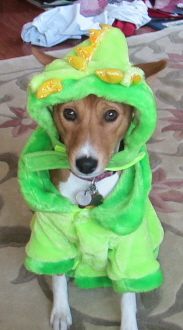 There
are many ways that breeder can be involved in the fancy. Active
involvement in the basenji community is another way that responsible
breeders help preserve the breed. Some ways to be involved are
club membership and participation and helping with rescue efforts.
There
are many ways that breeder can be involved in the fancy. Active
involvement in the basenji community is another way that responsible
breeders help preserve the breed. Some ways to be involved are
club membership and participation and helping with rescue efforts.Responsible breeders are members of clubs such as the Basenji Club of America, local basenji clubs, and local all breed clubs. They do not stop at just being members, they are also active in the club’s events and efforts. They serve on committees that help address the concerns in the breed. They help out at the events sponsored by their clubs. They are informed about current events and news that affects the breed.
Responsible breeders also help rescue organizations. There are always many jobs to be done by volunteers for rescue groups. Responsible breeders not only keep track of their own dogs so they do not end up in rescue they help the dogs that do not have that support. Some of the ways they may help is by doing evaluations, home visits, transportation, fostering, and helping to locate the dog’s breeder when known.
A Lifetime Commitment
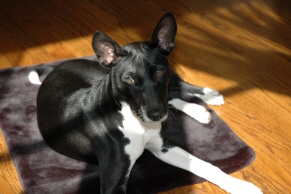 After
all the time, love, and work that a responsible breeder has put into a
litter it is important to them that their puppies have wonderful homes
for their entire lives. Since many things can happen during the
lifetime of a dog a responsible breeder uses a contract that states
that if at any time during the dog’s life the owners can not keep it
the breeder will be contacted. This is important not only so the
dog does not end up in the already overburden rescue system but also so
the breeder can provide support for the new owners. A responsible
breeder will stay in touch with you for the lifetime of the dog.
They are there for support when you encounter the various situations
that arise during puppy rearing, when you want to share a story about
how your puppy is fitting into the family, when you want to show off
pictures of dog or when you just want to touch base.
After
all the time, love, and work that a responsible breeder has put into a
litter it is important to them that their puppies have wonderful homes
for their entire lives. Since many things can happen during the
lifetime of a dog a responsible breeder uses a contract that states
that if at any time during the dog’s life the owners can not keep it
the breeder will be contacted. This is important not only so the
dog does not end up in the already overburden rescue system but also so
the breeder can provide support for the new owners. A responsible
breeder will stay in touch with you for the lifetime of the dog.
They are there for support when you encounter the various situations
that arise during puppy rearing, when you want to share a story about
how your puppy is fitting into the family, when you want to show off
pictures of dog or when you just want to touch base.Conclusion
There are many reasons to take the time to find a responsible breeder when it is time to add a puppy to your house. The benefits of the hard work responsible breeders put into their breeding program really show through in the puppies they produce. To help you interview perspective breeders the Basenji Club of America has put together a list of questions to help you screen breeders.